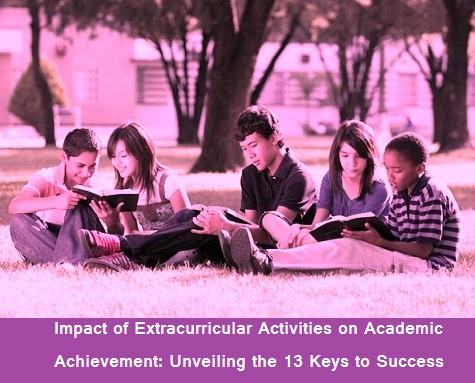The Impact of Extracurricular Activities on Academic Achievement: Unveiling the 13 Keys to Success
Engaging in extracurricular activities has long been regarded as a fundamental component of a well-rounded education. Beyond the classroom, these activities offer students invaluable opportunities for personal growth and skill development. Impact of Extracurricular Activities on Academic Achievement: Unveiling the 13 Keys to Success.
In this comprehensive exploration, we delve into the profound impact that extracurricular pursuits have on academic achievement, unveiling 13 key factors that contribute to a student's success.
Time Management Mastery:
Successful participation in extracurriculars fosters the development of effective time management skills. Juggling various commitments teaches students to prioritize tasks, leading to improved academic performance.
Enhanced Social Skills:
Collaboration and teamwork are often central to extracurriculars. Students who actively participate learn to communicate effectively, fostering better relationships with peers and teachers, positively influencing their academic environment.
Leadership Development:
Many extracurricular activities provide leadership opportunities. Students taking on leadership roles cultivate essential skills like decision-making and responsibility, which can significantly impact their academic endeavors.
Stress Reduction through Recreation:
Balancing academic pressures with recreational activities can reduce stress. Engaging in enjoyable extracurriculars serves as an effective stress-relief mechanism, creating a more conducive environment for academic success.
Improved Focus and Concentration:
Extracurriculars demand concentration and focus, skills that are transferable to the academic realm. Students often find that their ability to concentrate on studies improves as a result of their participation in these activities.
Goal Setting and Achievement:
Setting and achieving goals is a common thread in extracurricular involvement. This translates into a proactive mindset towards academics, encouraging students to set and accomplish academic objectives.
Expanded Skill Set:
Beyond the curriculum, students develop a diverse skill set through extracurriculars. From artistic talents to critical thinking abilities, these acquired skills can significantly enhance academic performance.
Positive Impact on Well-being:
A balanced lifestyle that includes extracurriculars contributes to overall well-being. Healthy students are better positioned to excel academically, as physical and mental wellness are closely tied to educational success.
Networking Opportunities:
Extracurricular activities often provide networking opportunities with professionals and peers who share similar interests. Networking can open doors to mentorship and academic support.
Building a Strong College Application:
Colleges and universities value well-rounded applicants. Inclusion of diverse extracurricular experiences can bolster a student's college application, positively influencing the admissions process.
Cultural Awareness and Diversity Appreciation:
Participation in clubs or groups often exposes students to diverse cultures and perspectives. This broadened worldview enhances critical thinking skills, contributing to academic excellence.
Increased Motivation and Engagement:
Enjoyment of extracurricular activities can spill over into academic motivation. Engaged students are more likely to participate actively in class, leading to improved academic performance.
Sense of Community and Belonging:
Being part of an extracurricular community fosters a sense of belonging. Students who feel connected to their school are more likely to invest in their academic success.
Conclusion:
In conclusion, the positive impact of extracurricular activities on academic achievement is undeniable. The 13 factors explored in this article underscore the importance of a holistic approach to education. By actively participating in diverse extracurricular pursuits, students not only enrich their personal lives but also lay the foundation for a successful academic journey. Balancing academics with a well-rounded set of activities equips students with the skills and mindset needed for lifelong success.
Recent Posts
- 13 Pioneering Ways STEM Education Shapes Future Leaders
- The Rise of Vocational Education: A Practical Guide for Career Success
- Breaking Down College Admission 13 Myths What Really Matters
- Navigating Online Learning: 13 Tips for Success in the Digital Classroom
- Where to Donate Books
- Community Action Utility Assistance Application
Author


0 comments:
Post a Comment